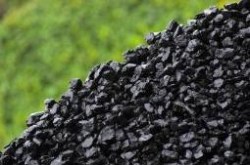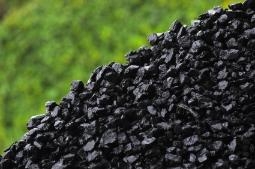Here’s a radio ad the Obama campaign ran recently in Ohio.
[protected-iframe id=”fce029ab7ada5891415a32816a1990b6-5104299-36375464″ info=”http://archive.org/embed/ObamaCleanCoalAd” width=”470″ height=”30″ frameborder=”0″]
The ad is a quick ride down a rocky slope: a declaration of the president’s commitment to “clean coal,” a celebration of fracking, and one final ding on Romney for a (rational, politically smart) 2003 attack on coal. Vote Obama, Ohio. He loves coal.

Green versus coal. But which is Obama?
Three months from election day, we’re witnessing another example of the 2012 presidential election’s descent into Bizarro world. A Democratic president attacks his Republican opponent for being hostile to fossil fuel production days after the end of the hottest month in American history? How is this an accurate reflection of policy priorities?
The answer is: It isn’t. Politics and policy are distinct. Candidates run on politics, govern on policy, and spend most of a political campaign trying to blend the two. The Obama ad above is trying to do exactly that: turn his policy moves (like allowing natural gas extraction) into a political asset in a state desperate for jobs.
We’ve discussed how wind energy is playing a larger and larger role in the campaign. It goes without saying that coal is a huge policy issue, particularly in states touching the Appalachians. That’s why for months Republicans have pointed to a nonexistent Obama administration “war on coal,” trying to pin the blame for a faltering coal industry on the policies of his administration.
The lens, as with all policy issues this year, is jobs. The Charleston Gazette has a report today that suggests what the “war on coal” means for coal employment.
Coal-mining employment in West Virginia dropped by nearly 1,300 jobs in the second quarter of the year, according to preliminary numbers that illustrate the coal industry’s continued decline in the face of cheap natural gas, declining reserves, and competition from other coal regions. …
Current statewide numbers are roughly the same as the last full quarter of George W. Bush’s presidency, according to jobs numbers mine operators report to MSHA.
West Virginia mining employment is up by nearly 1,800 jobs — more than 8 percent — since the Obama administration began initiatives aimed at cracking down on mountaintop removal mining. And, the most recent quarter’s figures show the seventh-highest number of jobs over the last 40 quarters, or 10 years. …
Concerns about mountaintop removal’s impacts, air pollution from coal-fired power plants, global warming, and miner safety and health continue to pressure the industry, which claims an unfair effort by President Obama to shut it down.
But government and private forecasts have for years projected a decline in Southern West Virginia production, fueled by quality reserves being mined out and increasing competition from giant surface mines in Wyoming’s Powder River Basin.
Emphasis added. Coal jobs are steady since Obama took office, despite the nation’s shift toward natural gas. The “war on coal” so far affects mostly plant owners, who are being forced to absorb the cost of their own pollution.
But facts are never as powerful as belief. The mineworkers union, which endorsed Obama strongly in 2008, has decided to sit this election out. Said Mike Caputo, a union official: “I don’t think quite frankly that coalfield folks are crazy about either candidate.”
“Our members count on coal-fired power plants and burning of coal to keep jobs,” Caputo said. “We’re a very Democratic union and we try to listen to the rank and file. They’ve sent a clear message that they’re not supportive of the environmental rules that are being put in place.”
Environmental rules are tangible, unlike macroeconomic trends. It is very much the case that the Environmental Protection Agency has worked to combat pollution from coal, primarily by establishing baselines for the emissions from coal-burning facilities. It’s a short line to draw from new pollution controls to coal plant costs — especially when political opportunists spend a lot of time and energy making that line as thick and black and visible as possible.
Last month, the CEO of Murray Energy, a coal-plant operator, went on CNN to argue — contrary to all presented evidence — that Obama was to blame for the drop in coal demand. The CEO, Robert Murray, has a vested financial interest in reinforcing that line between the president and the decline of coal: If Obama wins reelection, it’s more likely that Murray will be forced to reduce his plants’ pollution. It’s why Murray, as CNN noted on-air, is a major contributor to the Republican Party.
Murray’s complaint and the mineworkers’ diffidence both show the coal industry’s eagerness to find a scapegoat for its decline. Coal has two options: Washington or itself. Which do you think it’s going to choose? Unfortunately for Barack Obama, the issue is coming to a head within easy sight of a key political election. So he’s forced to try to reconcile his policy moves with the inexorable politics of Ohio, Pennsylvania, and West Virginia — to claim that he is a champion of a dying industry.
This is perhaps the last great moment of political leverage from the coal industry. In 10, 20 years, we’ll look back at this as an anachronism. But for Barack Obama, a president who has done less than he should have to curtail carbon pollution from fossil fuels, even his meager efforts on coal are a big political liability.



